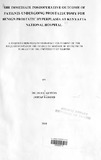| dc.contributor.author | Kiptoon, Dan K | |
| dc.date.accessioned | 2013-05-23T08:47:15Z | |
| dc.date.available | 2013-05-23T08:47:15Z | |
| dc.date.issued | 2004 | |
| dc.identifier.citation | Master of Medicine in Surgery of the University of Nairobi 2004 | en |
| dc.identifier.uri | http://erepository.uonbi.ac.ke:8080/xmlui/handle/11295/24717 | |
| dc.description.abstract | Objective: To describe the common postoperative complications of prostatectomy as
seen at Kenyatta National Hospital.
Materials and Methods: This is a prospective study of patients who underwent
prostatectomy for benign prostatic hyperplasia at Kenyatta National Hospital between
6th October 2003 and 21 st June 2004.
Main outcome measures: Age, co-morbidity, type of surgery, complications, reoperation,
mortality, postoperative catheterisation, and duration of postoperative
hospital stay.
Results: A total of eighty five patients participated in the study, and their average age
was 66 years. Open prostatectomy was the more common type of prostatectomy
accounting for 81 % of cases while transurethral resection accounted for 19 % of
cases.
The most common intra-operative complication during prostatectomy was
haemorrhage which occurred in ten patients (11.8 %).
The most common postoperative complication following prostatectomy was wound
sepsis occurring in 24 patients (35 %, n=69). Other postoperative complications
observed were urinary tract infection (15 %), clot retention (10 %), pyrexia (10 %),
and pneumonia (8.2 %).
Three patients (4.4 %) required re-operation due to complications of postoperative
wound sepsis.
One patient had perforation of the bladder during transurethral resection and required
a laparotomy to repair the bladder.
Twenty six patients (30 %) had co- existing medical conditions. There was a
significant association between wound sepsis and diabetes mellitus (p< 0.05).
The mean duration of postoperative catheterisation was 6.66 days. There was a
significant difference in the duration of postoperative catheterisation between open
prostatectomy and transurethral resection (p= 0.001).
The mean duration of postoperative hospital stay was 8.16 days.
There was a significant difference in the duration of postoperative hospital stay
between open prostatectomy and transurethral resection (p= 0.001).
Conclusions: The duration of postoperative catheterisation and hospital stay are
mainly determined by type of prostatectomy, and the presence of diabetes mellitus
significantly increased the risk of developing postoperative wound sepsis. | en |
| dc.language.iso | en | en |
| dc.publisher | University of Nairobi | en |
| dc.title | The immediate postoperative outcome of patients undergoing prostatectomy for benign prostatic hyperplasia at Kenyatta National Hospital | en |
| dc.type | Thesis | en |
| dc.description.department | a
Department of Psychiatry, University of Nairobi, ; bDepartment of Mental Health, School of Medicine,
Moi University, Eldoret, Kenya | |
| local.publisher | School of Medicine | en |

